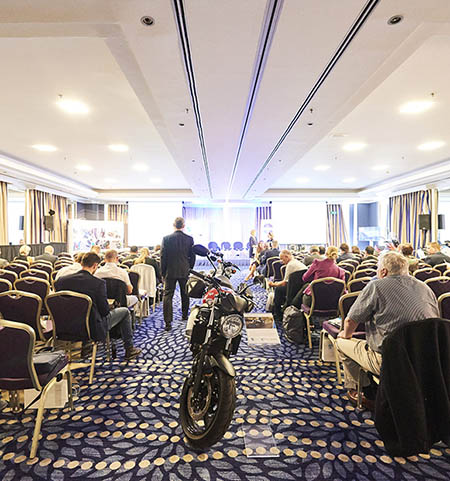 Europe – Motorcycle industry launches new European Training Quality Label at motorcycle safety conference.
Europe – Motorcycle industry launches new European Training Quality Label at motorcycle safety conference.
The European Association of Motorcycle Manufacturers, ACEM, hosted today (8th September 2016) its 12th annual conference, ‘The Safe Ride to the Future’, around the issue of motorcycling safety in the European Union. This edition of the Brussels annual conference attracted more than 150 attendees from the motorcycle industry, European and national administrations and users’ organisations, as well as a wide range of stakeholders.
The event explored key issues around motorcycle safety such as the benefits of advanced vehicle technology for powered-two wheelers, the need to ensure that all road users have adequate behaviours on the road, or the importance of inclusive motorcycle safety plans, particularly at national level.
As part of the conference, ACEM and the German Road Safety Council (Deutscher Verkehrssicherheitsrat) presented a new European Training Quality Label for high-quality post-license training programmes. A motorcycle training scheme run by the Royal Dutch Motorcycle Federation (KNMV) was the first one to receive the certification.
ACEM also organised an exhibition on motorcycle safety technology that featured some of the latest vehicle models launched by the industry as well as innovative safety devices such as a side view assyst system, a wireless airbag jacket and an electronic windscreen.
ACEM and BMW Motorrad President Stephan Schaller said: “ACEM members manufacture some of the most advanced motorcycles and mopeds in the world. But it is also important that motorcyclists have good riding skills and a responsible attitude on the road. This is precisely why we are partnering with the German Road Safety Council to promote the best post-license training programmes across Europe”.
“Intelligent transport systems (ITS) solutions have also started to make their way into our industry. We expect that in the future vehicle-to-vehicle (V2V) technologies will help to reduce the risk of accidents by allowing powered two-wheelers to effectively communicate with other vehicles”.
ACEM Secretary General Antonio Perlot said: “There are more than 36 million motorcycles and mopeds on Europe’s roads, which help to save time and money for commuters, increase urban traffic fluidity and reduce congestion”.
 “Today’s discussions clearly showed that motorcycling safety is a shared responsibility, and that it is essential that vehicle manufacturers, European and national administrations and users’ organisations work together to achieve lasting safety improvements”.
“Today’s discussions clearly showed that motorcycling safety is a shared responsibility, and that it is essential that vehicle manufacturers, European and national administrations and users’ organisations work together to achieve lasting safety improvements”.
At Motorcycle Minds we know from these types of conferences there is good work and good networking opportunities, over the “walking lunches” to put your view across. However the reality in the reporting is that it makes no sense to “everyday” riders, because it is too distant from everyday life.
What we have to rely on is subsequent reports from the riders’ organisations present, presumably representing you and me. The ACEM pictures are fantastic with photos of past glitterati and to our astonishment, we saw the first picture of a man we knew in a suit and stylish shoes – now that was a surprise!
Meanwhile two days to go till we travel to Spain for our Elaine to take part as an COST expert at a workshop to chew the fat with other researchers on the whys and wherefores of road traffic collisions.
Although her expertise effectively focuses on motorcyclist fatalities, she has written reports about other road user collisions, including pedestrians and vehicle occupants (mainly cars) – www.righttoride.org.uk
She will contribute to the IRCOBI 2016 Malaga Preconference Workshop on Crash Reconstruction: Conference Programme
Original Source text and pictures ACEM – Here
About ACEM
The European Association of Motorcycle Manufacturers, ACEM, is the professional body representing the interests of the L-category vehicle industry in Europe (i.e. mopeds, motorcycles, tricycles, quadricycles). ACEM members include 17 manufacturing companies as well as 17 national associations based in 14 European countries. About 156,300 jobs in the EU depend on the L-category industry.
ACEM manufacturing members are: BMW Motorrad, Bombardier Recreational Products, Ducati Motor Holding, Harley-Davidson, Honda Motors, Kawasaki Motors, KTM Motorrad, Kymco, MV Agusta, Peugeot Scooters, Piaggio Group, Polaris Industries, Renault, Royald Enfield, Suzuki, Triumph Motorcycles and Yamaha Motors.
More information on ACEM can be found at www.acem.eu
About the German Road Safety Council
The German Road Safety Council (DVR) was founded in 1969. It coordinates a wide range of activities for its 200 members and develops road safety programmes. Among the key issues that the DVR deals with are traffic engineering, traffic law, awareness-raising and traffic education.
To learn more about DVR please visit: www.dvr.de


Outside Comments From Motorcycle Minds
Yesterday in Brussels the European Motorcycle Industry held its annual conference. The interest for me at least is related to the training programme that the industry is promoting with “the German Road Safety Council (Deutscher Verkehrssicherheitsrat) presented a new European Training Quality Label for high-quality post-license training programmes. A motorcycle training scheme run by the Royal Dutch Motorcycle Federation (KNMV) was the first one to receive the certification”.
For those of us outside the “In Crowd” we have reservations about industry becoming involved in training. Why is that? Simply because of (not just our) concerns about vested interests. The question that needs asking: is it really about making money, considering that the trainers adhering to the programme will require accreditation and we assume that this won’t be free of charge.
Our good friend in the US of A David Hough could give verse and chapter about industry getting involved in training, it’s not something he is fond of. From our perspective – there appears to be a major conflict of interest and I personally don’t know how this issue can be resolved. We know from our friends in the UK that the scheme there effectively means that any independent trainer has to pay to attend industry courses in order to promote this training method and “of course” has to be accredited.
We know that better training (e.g. hazard awareness) is the perferred option (for us anyway), equally as we have pushed in the past – rather than testing between the driving licence catgories, the minimum required 7 hours of training would do far more to reduce road traffic collisions. This appears to reflect the programme which ACEM is promoting – however for us at least the sticking point remains this:
“How does the European Training Quality Label work in practice? This voluntary certification procedure is open to a wide range of organisations based in Europe and willing to submit their training programmes for evaluation (e.g. riding training schools, manufacturers, public bodies)”.
For an indepth explanation of this programme, the European Commission has set it out in detail – Here
For details of the ACEM Conference see – Here
Elaine Hardy PhD
Published Originally at Linked in